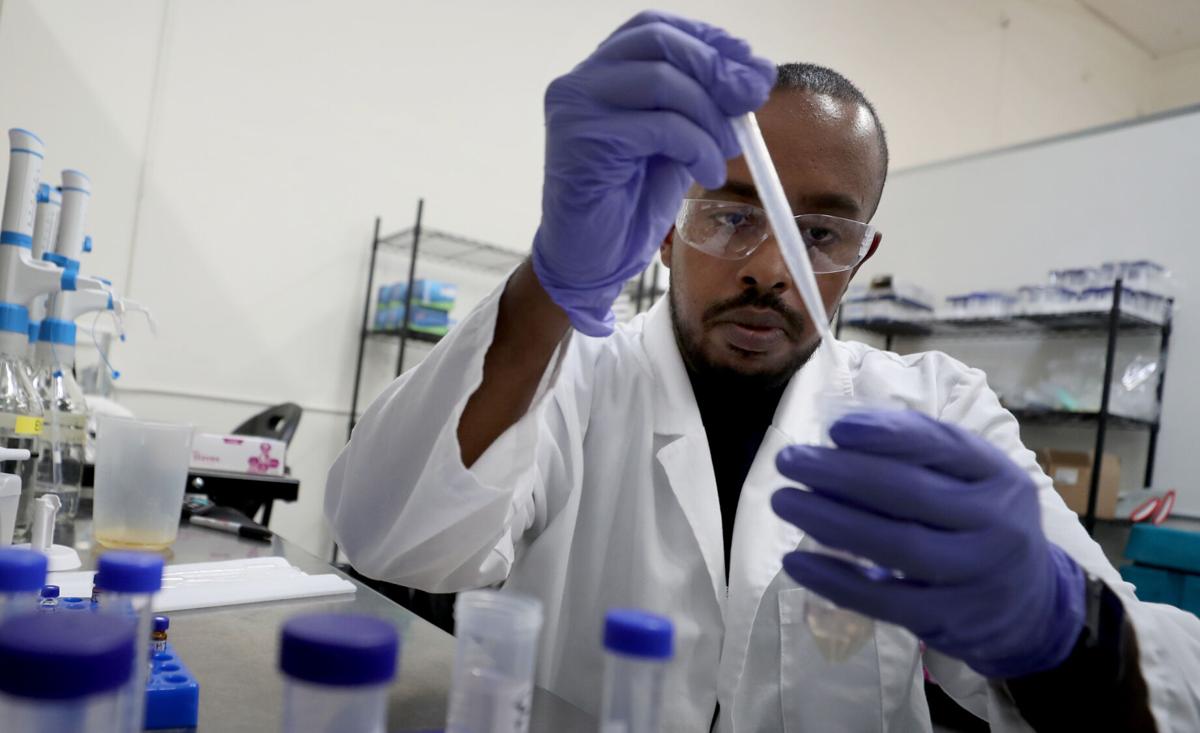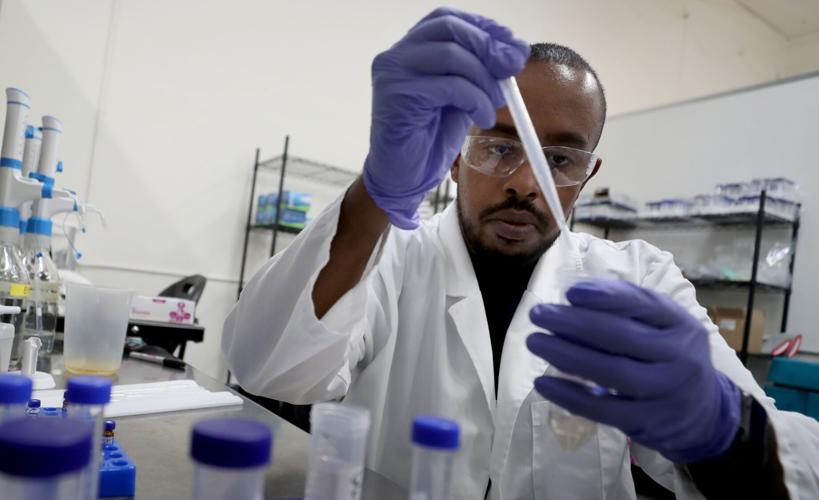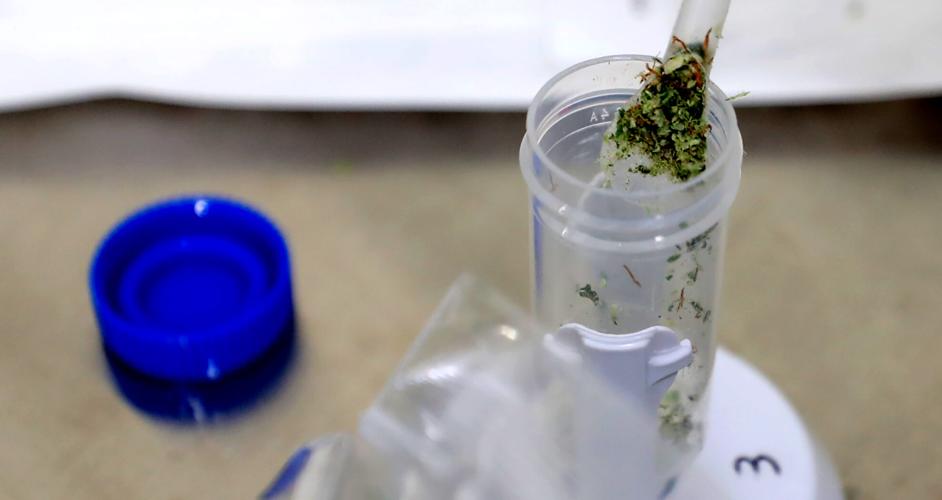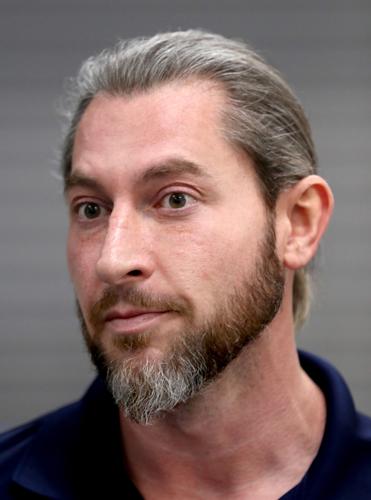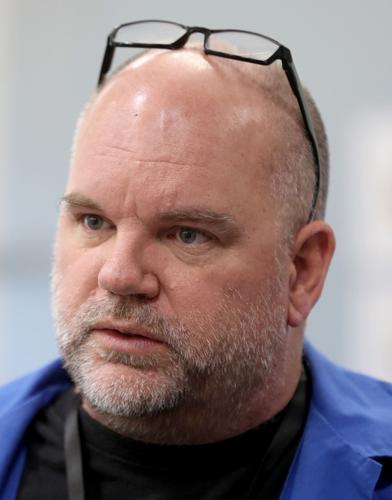In a nondescript industrial park just north of Tucson International Airport, scientists at Titan Laboratories are hard at work. Some are breaking up specimens in specially designed centrifuges, others wait for the latest readout from a near-million-dollar piece of machinery on a diagnostic test looking for pesticides to the parts-per-billion.
“So this is the infrastructure,” says Robert Brodnick, CEO and one of the co-founders of Titan Labs, gesturing around the large streamlined space. “We can point to the cooler, the nitrogen generator and all these things you don’t usually see in a cannabis testing lab.”
That’s right, despite its name, which evokes the defense or space industries, Titan Labs is the first third-party, comprehensive cannabis testing lab in Southern Arizona.
And while it waits for that last step of state approval, Titan is already running the sort of tests growers, product producers and, most importantly, dispensaries need to guarantee their products are within potency limits and free of contaminates.
People are also reading…
Here’s how one of the most advanced cannabis testing labs in the state came to be in Tucson, and how two ex-military officers, who used to run the nation’s premiere drug testing lab, eventually switched to a different kind of testing.
The origin story
While Titan Labs sits on Valencia Road now, its origins go back to Aberdeen, Maryland, home of the U.S. Army Medical Research Institute of Chemical Defense.
That’s where Brodnick and Will English, the lab’s other co-founder, had their first military assignment as officers together.
“We just kind of had the same career pathways over eight, nine years between chemical and biodefense and then combat casualty care, then forensics at the end,” Brodnick explained.

Brodnick
That was before the duo got involved in testing for “drugs of abuse” for the Department of Defense in Hawaii. English was appointed the facility’s technical director where Brodnick was the unit’s deputy commander. English’s wife, Maya Leonetti, oversaw quality control.
But after hearing some of the personal stories of soldiers and others who had tested positive for marijuana and how they had turned to the substance to treat pain or avoid opiates, both decided to make a move to the other side of the testing aisle.
“We all kind of looked at the cannabis space at the same time and said, ‘We need to go be on that side of things a little bit more,’” Will English said.

English
Soon, the duo formed a consulting firm to help fix and set up other analytical cannabis testing labs in other states, with a primary focus in California, according Brodnick. Eventually, they decided to look for a state they could set up their own lab.
First, however, they had to find financial backers. Where they could find those initial investors would prove important.
“We were wheelin’ and dealing with some Chicago guys. The Chicago guys knew these Tucson guys and the Chicago guys’ deal fell through,” Leonetti said. “And thank God!”
Ultimately the Tucson guys, led by local ear, nose and throat Dr. Robert Dean, materialized as the group’s best shot for getting their own lab started.
Once things were finalized, the duo and their wives moved to Tucson in December 2020 and went about the work of building the lab of their dreams from scratch. It would be no small undertaking, especially during a global pandemic and supply crunch.
“Everything just went a little bit slower,” Brodnick said. “Everything got done remotely, but it all took a quarter longer than it was supposed to for construction. Same thing happened when we went to install our instruments.”
Now that the lab is mostly built out and there is enough equipment to conduct the tests for Arizona’s Big 5 (potency, pesticides, microbes, heavy metals and residual solvents), the challenge is in clearing the final hurdle set by the state to be an approved third-party testing facility.
“I know the investors would have liked this to have been done about nine months ago, but it took time,” English said.
‘Avengers of cannabis testing’
In the meantime, since the state allows for some partial testing, and since local growers and dispensaries are already looking for a local alternative to having to drive at least an hour and a half north to the nearest state-approved testing facility, English and Brodnick have hired a crew of fellow scientists to help conduct the necessary tests.
While many labs focus on hiring from talent pools within the marijuana industry, Titan went about staffing a little differently.

A small amount marijuana is spooned into a tube during a demonstration of the process of preparing a sample for testing at Titan Laboratories Tucson.
According to Brodnick, he and English wanted to build a team of experts with different professional backgrounds and specialties. He described it as “assembling the Avengers of cannabis testing.”
To test for heavy metals, they brought in Davian Pedroza. Pedroza, who sports a background in mining and precious metals, had plenty of experience with the machinery that uses mass spectrometers to ferret out impurities and was able to apply those same skills to looking for similar metals in marijuana.
“At the end of the day, it’s in a sense less about actual cannabis,” he said. “As the guy who’s been doing chemistry for some time compounds are compounds, OK? I used to take copper out of rocks and now, I’m taking iron out of plants.”
Still, some of the talent drawn to Titan comes from within the marijuana industry, too. Tristan Davis, a chemist, started his work in marijuana extracts and distillates, a branch of cannabis products that is known for having high levels of the psychoactive compound THC, or Tetrahydrocannabinol.
Davis said he was drawn to Titan because of the mission the lab stands for: changing the perception of a product often thought of as verboten by mainstream society into something that is quantifiable and held to safe, scientific standards.
“We’re providing the community with a lot of beneficial information,” he said. “Because you take an extraction lab who provides this concentrate product to people, and then it takes this kind of lab to provide the analysis so that the consumer knows what they’re ingesting.”
That’s a sentiment Davis’ fellow chemist, Kristyn Chiappone — who came to Titan from a forensic drug testing lab — shares. Chiappone said she was ready for a change from finding drugs in people’s systems to finding out how drugs will affect people’s systems.
“I’m continually learning new things every day,” she said. “So I know the instrumentation — that’s the same through everything — but what I’m doing with it and what analytes I’m testing for are very different.”
Brodnick said that on top of chemists and metallurgists, Titan also has microbiologists and other scientists on staff as well. And all it took to get everyone in the door was one free LinkedIn ad looking for help.
“It was amazing,” Brodnick said. “You could not have asked for a better, more talented group of people.”
The future
With a state-of-the-art lab ready to go and a staff of highly trained and qualified scientists ready to conduct the tests, all Titan is waiting on is final state approval to start the countdown to blastoff.
English, who on top of being co-founder is also the lab’s technical director, said he’s been ready for things to officially start up. While he said he’s anxious to get going, he understands the wait.
“We’re not going to do anything before this state lets us. That is just kinda the way it is.”
In the meantime, both English and Brodnick are already thinking expansion. They’re already in possession of the space next door in the industrial complex, a space they plan to use to expand the lab even more.
And since the machinery and technical equipment at Titan is so advanced and new to the industry, both men believe it’s just a matter of time before some producers and brands are asking for tests to determine other profile characteristics in cannabis besides just potency.
“It’s all these different cannabinoids and what other biological interactions do you have with cannabis in nature? Now we’re learning so much cool stuff,” he said.
Check out five shows in Tucson's massive gem and mineral showcase.
Edward Celaya is a breaking news and marijuana reporter. He has been on both beats since May 2021.



